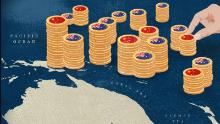(CNN)It was pitched as a rare repatriation flight to bring people stranded in China back to their Pacific Island home which has yet to report a single coronavirus case.
But of the 104 people on board the chartered Solomon Airlines flight from the southern Chinese city Guangzhou on September 2, only 21 were from the Solomon Islands.
The rest were Chinese nationals, according to a report by Radio New Zealand which cited the passenger list.
In the days before the flight landed in the country's humid capital, Honiara, local politicians and non-governmental bodies urged the Solomon Islands' Prime Minister to call it off.
Despite China reporting just a handful of new coronavirus cases each day for the past few months, to some, the risk was too great. The Solomon Islands' borders have been almost entirely sealed for months. This flight, they worried, could bring the first reported case of Covid-19 into the country of almost 700,000, and wreak devastation on its poor health system.
But the government didn't listen.
For Daniel Suidani, the premier of the country's most populous province, Malaita, the nation's leaders were putting their new relationship with Beijing before their own people. The Solomon Islands swapped allegiances with the democratic self-governed island of Taiwan for communist Beijing last year. Beijing considers Taiwan part of China, and refuses to have diplomatic relations with any nation that doesn't recognize its "One China Policy."
Two days before the Honiara flight was due to land, Suidani announced an independence referendum for Malaita.
"Our conviction is that the ... administration has become so obliged and indebted to China that it can no longer provide essential services to protect its citizens' public health," he said in a statement emailed to CNN. "It is time for Malaita people to see whether they are still willing to be part of a country (whose) leadership is becoming dictatorial."
CNN reached out to the Solomon Islands' central government for comment on the allegation that they are no longer looking after their people, but received no response.
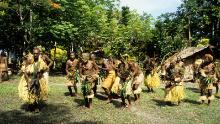
While longtime Prime Minister Manasseh Sogavare welcomes China and the economic benefits it promises, some fear that Beijing is too powerful to be an equal partner for the Solomon Islands. The Solomon Islands has reportedly considered leasing an entire island to China and debated offering investment-for-citizenship deals to mainland Chinese.
China's foreign ministry told CNN that the establishment of diplomatic relations between China and the Solomon Islands had been "open and fair."
"Any rumors and slanders cannot affect the development of friendly relations between China and the Solomon Islands," the spokesperson said.
The switch and the stadium
In the Solomon Islands' verdant capital, Honiara, there's a stretch of land with scars of the famous Battle of Guadalcanal, a World War II campaign that was the Allied forces' first decisive victory in the Pacific theater.
Now, some of that land has been earmarked for a new stadium bankrolled by China -- and it has become the symbol of a new type of battleground.
After the Solomon Islands won the right to host the 2023 Pacific Games -- the region's answer to the Olympics -- the country was in need of a venue to host athletic events. In July 2019, the Solomon Islands' diplomatic ally of more than three decades, Taiwan, agreed to help out with a loan.
Months later, in September 2019, the Solomon Islands ditched its diplomatic ties with Taiwan for Beijing, throwing the future of the stadium into jeopardy.
The Solomon Islands had recognized Taiwan since 1983. In the years since, Taipei poured millions of dollars into the Solomon Islands, including in development projects such as a hospital, according to a paper by Clive Moore, a professor at the University of Queensland who specializes in the Solomon Islands. Taiwan also poured money into a slush fund for Solomon Islands politicians, Moore said.
The Solomon Islands had stayed loyal even as China's checkbook diplomacy in the strategically important region prompted Pacific neighbors to switch allegiances.
To Taiwan, every diplomatic partner counts, no matter how small. It now has only 15 official allies, and all four of its remaining Pacific allies have smaller populations than the province of Malaita. That meant keeping the Solomons as a partner was a big deal.
But by 2019, the lure of a more economically beneficial relationship with China became too great. Jian Zhang, an expert in Asian security affairs at the Australian Defence Force Academy, told CNN that economic considerations were the key factor in the Solomon Islands' decision. That was clear in Sogavare's statement following the switch: "Our nation of Solomon Islands is bound to reap huge benefits never seen before in the history of our young nation, in this new relationship with PRC," he said.
For years, China had been the country's largest trade partner, importing annually millions of dollars of rough wood -- the country's biggest export -- according to the Observatory of Economic Complexity (OEC). Some Chinese construction companies started projects in the Solomon Islands, including a 96-meter-long concrete bridge in 2018, according to state media Xinhua.
Now, China was reportedly promising that the relationship could be worth even more. The amount of financial support China promised to the Solomon Islands prior to the switch hasn't been made public, however, in a Radio Taiwan International report, Taiwanese Foreign Minister Wu Zhaoxie was quoted as saying that in his understanding, China had promised around $500 million. It is not clear what form that that support would take.
CNN reached out to China's foreign ministry and the Solomon Islands central government for comment. The Solomon Islands government did not respond.
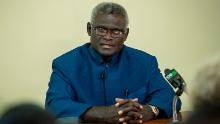
If that $500 million figure is correct, it would be more than Taiwan's contribution in the last decade. According to Australia-based think tank, the Lowy Institute, Taiwan spent between $11 million and $22 million in official development assistance grants -- the "gold standard" in foreign aid -- in the Solomon Islands each year between 2011 and 2017. China spent $39,000 in grants in the Solomon Islands over the same period, according to Lowy data.
But it did offer trade. In 2018, 67% of the Solomon Islands' $869 million in exports went to China -- only 3% was bought by Taiwan, according to the OEC.
So the decision by one of the poorest countries in the Pacific to switch was perhaps unsurprising.
"To be honest, when it comes to economics and politics, Taiwan is completely useless to us," Prime Minister Sogavare said, in an interview with the Australian Broadcasting Corporation ahead of the change in political allegiance.
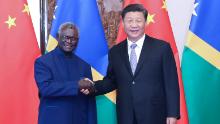
After the move, Taiwan's Ambassador to Palau said Taiwan's "heart was broken," Radio New Zealand reported. Mike Pence, the vice president of the United States, reportedly canceled plans to meet the Solomon Islands' Prime Minister last September. The US has not had formal diplomatic ties with Taiwan in more than 40 years, but it remains a key strategic ally.
The switch also left the future of the Solomon Islands' 10,000-seat stadium in jeopardy -- but not for long.
In October 2019, a month after the Solomon Islands agreed to switch allegiances, Beijing promised the Solomon Islands 74 million Australian dollars ($54 million) for the stadium.
It wasn't a loan -- it was a gift.
In the months since, reports from local media suggest that limited progress has been made on the stadium. The Solomon Islands closed its borders to foreigners in March, and since then only around 800 citizens and a few dozen foreign essential workers have entered the country, according to a government statement.
So when the government approved the flight in August, full of Chinese workers on the stadium project, some believed the government was prioritizing the stadium over the people. Li Ming, the first Chinese ambassador to the Solomon Islands, was also on board for his inaugural trip in the position.
Although the government of the Solomon Islands said passengers all tested negative before boarding the flight, many in the Solomon Islands were shocked by the decision to let a high volume of Chinese nationals into the country when borders were meant to be closed.
"We are risking the entire nation," said non-governmental organization Transparency Solomon Islands. "It seems the executive government is not listening anymore to the calls made by the citizens of this country."
"The expectation is that entry of the pandemic would be a disaster," Joseph Foukona, an assistant professor at the University of Hawaii who hails from Malaita, said on September 3, as he explained why the flight was so unpopular.
Fears in Malaita
In the days ahead of the flight landing, some in Malaita feared that the province's Chinese community -- who make up less than 1% of the population of Malaita's 160,000-strong population, according the 2009 Census, the most recent available data -- would travel to the capital to welcome the new ambassador off the plane, and then return to the province bringing Covid-19 with them, Foukona said.
That prompted the Malaita for Democracy (M4D) activist group to issue a letter telling all Chinese people to leave the provincial capital, Auki, within 24 hours, according to local media reports.
And this wasn't the first time that the Solomon Islands' long-standing Chinese community of a few thousand people had faced local hostility. In 2006, there were riots in Honiara's Chinatown over the growing presence of Chinese business people, whose families mostly came to the Solomon Islands to work before the country gained independence from Britain in 1978.
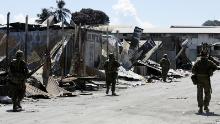
In that instance, Beijing had to charter a flight to evacuate hundreds of Chinese nationals.
These days, there are multiple private and state-owned Chinese companies in the Solomon Islands, according to Chinese Communist Party-controlled media Global Times. That has led to a sense among some Solomon Islanders that Chinese people had already taken over. "A current joke is that people lament the decline of Honiara's quaint Chinatown, which is no longer central, but then others say it does not matter as the whole of Honiara is a Chinatown now," said Moore.
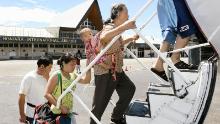
Ahead of the flight, police patrolled the streets of Auki to maintain calm, according to local media.
On September 1, before the flight landed, Suidani sent a statement to media in a Word document without any official letterhead, announcing that his province, a collection of islands with a population the size of Salt Lake City, would hold an independence referendum this month. CNN confirmed the authenticity of the letter. He pointed to the continued pressure from the "intimidating" central government to allow the Chinese Communist Party into the province. "No one should think that they have any monopoly powers to exert their bad decisions on us," he said.
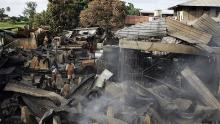
In an interview with CNN, Suidani said the central government's sole responsibility was to take care of its people. "But what I've seen of the Solomon Islands government, this government doesn't look after us."
"We are just wondering whether the government is caring about people's lives or thinking of the stadium, because we have seen that the government hasn't heard the cries of the people," Suidani said.
Already, there has been a suspected quarantine breach. Last Tuesday, Solomon Island police said they were investigating an incident where a Chinese national in quarantine in Honiara passed a package to someone outside the facility.
When CNN asked if China was concerned for its Solomon Islands-based citizens, the country's foreign affairs ministry said it believed the Solomon government has the capability to deal with its own affairs.
Calls for independence
When Suidani made a call for an independence referendum, it wasn't entirely out of the blue.
Although the Solomon Islands is small -- only around 36 times the land area of New York City -- it's home to more than 63 different local languages and a vast array of cultures, forced into one country by the British colonizers who first established a protectorate in the Solomon Islands in 1893.

Those divisions have often been the fault lines of conflicts.
In 1998, rebels on Guadalcanal island tried to overthrow the country's then Malaitan ruler. That sparked years of ethnic tensions costing 200 lives, according to the Truth and Reconciliation Commission, and prompting concern in the region that the Solomon Islands could become a failed state. Countries such as Australia and New Zealand sent in troops to stabilize the situation, and an Australia-led peace-keeping mission lasted until 2017.
In Malaita, an independence movement has simmered for decades, due to long-standing feelings of marginalization from the central government, said Graeme Smith, an expert in China's investment in the Pacific at Australian National University.
In the months before the charter flight, there had been signs of disagreement between the central government and Malaita, according to Foukona. CNN made multiple requests for comment from Sogavare's government, but received no reply.
Last year, Suidani was one of the outspoken critics of rescinding official recognition of Taiwan, furthering tensions with the central government.
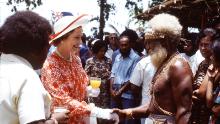
He was worried about Chinese businesspeople coming into the country and taking ownership of businesses and land away from local people -- already, he tells CNN, he has seen Chinese people in the logging industry coming to Malaita and not respecting the local rules. "I believe in getting this illegal development out of Malaita," Suidani said. CNN reached out to China's foreign affairs for comment on the practices of Chinese in the logging industry and was told that the Chinese government "requires Chinese companies to abide by local laws and international rules."
Suidani is also concerned that close relations with China's Communist Party could impact democracy and freedom of religion in the Solomon Islands, a strongly Christian country. In Fiji, a Pacific Island country which is aligned with China, there are already concerns about the way its diplomatic partner is limiting freedom of speech there.
As coronavirus spread in other countries, Suidani went his own way, and reached out to Taiwan for humanitarian aid in a bid to help the province prepare for a potential outbreak.. Taipei delivered a 50-ton shipment of rice in June, according to Radio New Zealand. But when Suidani thanked Taipei, he was reprimanded by the central government for calling Taiwan a country.
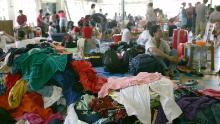
"Such divisive statement from a provincial premier threatens the unity of the country at a time when we need to work together in keeping Covid-19 from entering our borders and not politicize the virus," Solomon Islands' Foreign Minister Jeremiah Manele said.
Taiwan sent Malaita a shipment of medical supplies in June, but it was intercepted in the country's capital Honiara and investigated by police. In August, it was still being held, according to Taiwanese authorities, although it has since been released, Suidani said. That, too, exacerbated tensions between the province and the government.
What all this means
In the aftermath of Suidani's calls for a referendum, tensions have only ramped up in the small country.
Although a spokesperson for Sogavare told CNN "you will be copied-in if/when the PM makes a formal response to this story," the government has since put out statements calling Suidani's announced referendum "illegal," and saying that no provincial government has any business making a stand on foreign relations.
Back in Malaita, protests have broken out in the capital Auki after the provincial secretary was recalled to Honiara. "This call was made because of the effectiveness of (the provincial secretary) in stopping illegal logging operations exporting logs to China," the Malaita Provincial Government said in a statement.
"When government ignores the law, we are moving into the area of dictatorship. Solomon Islands is slipping into the direction of the one-party system of China as we have been warning all along."
For now, it's unclear whether the vote can even go ahead. Solomon Islands' Ministry of Provincial Government Institutional and Strengthening says that Suidani doesn't have the legal authority to hold a referendum, and the Minister of Provincial Government Institutional and Strengthening can suspend any expenditure if he doesn't believe it's in the public interest.
Even if Malaita's independence vote doesn't go ahead, it's clear that the diplomatic rivalry between China and Taiwan has inflamed political instability in the country, Jian Zhang, an expert in Asian security affairs at the Australian Defence Force Academy, told CNN.
Both Taiwan and China have a history of engaging with subnational players, although there has been no suggestion from political players that Taipei has influenced the call for an independence referendum. Zhang says it's possible that Taiwan's relationship with Malaita could eventually see the Solomon Islands switch allegiances again -- or, in the unlikely event that Malaita becomes an independent country, it could become Taiwan's new diplomatic partner.
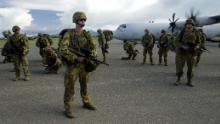
But if Malaita becomes a separate country, it will come at a cost. In an island where most people live on subsistence farming, University of Queenstown's Clive Moore says it will most likely require a foreign power, like Taiwan, to help prop it up, at least to begin with.
It would also be tricky to extract the province from the rest of the country. The province is in a central position, and its population makes up around a third of the country. According to Moore, the province is so central to the Solomon Islands that a split would basically mean the "destruction of a nation."
"If (Taiwan) really think a new nation in the Pacific could be their diplomatic friend, perhaps it's worth a punt," Moore said. "But encouraging it, it would destroy the Solomon Islands."
Just as Taiwan will need to decide whether its search for allies is worth the instability, the Solomon Islands will need to weigh up whether its intensified ties with Beijing are worth the risk.
For now, the 104 people -- including more than 80 Chinese nationals -- who were on board the flight from China are serving out their state quarantine in the capital, Honiara. Only time will tell whether the instability that flight caused was worth it.

 5 years ago
708
5 years ago
708 
